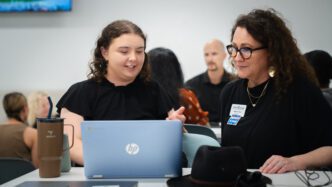Cameron Bushnell is looking to collaborate.
Beginning her third year as director of the Pearce Center for Professional Communication, Bushnell wants to work with more Clemson University colleges and departments to improve students’ communication skills.

“I firmly believe that writing is a key element to helping Clemson students prepare for meaningful work and lives in today’s world,” Bushnell said.
The Pearce Center sponsors an array of projects, such as training graduate students to teach writing and providing opportunities for undergraduate interns to take on communications projects in schools and nonprofit organizations.
In one recent project, Pearce Center interns collaborated with a Clemson professor to explore the University’s early history.
Another project had interns working with children in Centerville Elementary, Homeland Park Elementary and other schools to create and publish their own books with such titles as “Favorite Animals” and “Unhuggable Insects.”
Clemson has been recognized in the past as a top university for Writing Across the Curriculum. The Pearce Center aims to be a national leader in providing professional communication opportunities for students and faculty.
Writing should be a central component in every university discipline, said Bushnell, who also is a professor in the Clemson Department of English.
“Students will come to a better understanding of what it is they are learning if they know how to write about it,” Bushnell said.
“We can say that we really known something only when we can community that ‘something’ to others – in presentations, using video and images, but primarily by writing about it,” she added.
Strong communications skills also are highly valued in the working world.
“Being able to write well always comes out as one of the top skills graduates should have,” she said. “It may be writing to persuade a client or a potential employer or a potential business to which you’re making a proposal. These are very important reasons to be able to write better.”
What constitutes good writing?
“Good and effective communication is plainspoken and to the point,” Bushnell said. “It reflects the mind of the writer, but never forgets the audience. It is clear and vivid.”
And what’s the best way students can improve their writing skills?
“Find a writing partner,” Bushnell said. “Another reader will help you develop ideas and write more clearly.”
Bushnell’s views on writing are informed by her experiences as a professor in academia and a communications professional in the private sector.
While directing the Pearce Center, Bushnell maintains her professorial duties in the English Department. She regularly teaches postcolonial and world literatures, critical writing about literature, senior seminars, and graduate seminars on writing.
Before coming to Clemson, Bushnell worked several years for Nike International and Citizens Democracy Corps, a nonprofit she described as “a Peace Corps for business people.”
“I’ve written reports on international trade policy, supervised staff, managed shipping logistics, and worked with banks to arrange international credit,” she said. “My work gave me familiarity with writing in fields beyond the humanities. It also gave me experience in different approaches to problem solving.”
Pearce Center projects
The Pearce Center, part of the College of Architecture, Arts and Humanities, is distinct from the Clemson Writing Center, the latter of which works with students one-on-one to help them polish their essays and other writing assignments.
The Pearce Center currently focuses on two main projects to promote writing across the university curriculum: the Graduate TA Writing Program and the Pearce Center Intern Program.
The Graduate TA Writing Program is a course co-taught by Bushnell for graduate teaching assistants in several disciplines.
“The idea is to supplement their training with a focus on how to teach and assess writing better in their undergraduate classrooms,” Bushnell said.
“In other words, if you’re teaching a lab, how do you get better lab reports from your undergraduates? If you’re doing an essay on backpacking for a PRTM (Parks, Recreation and Tourism Management) class, how do you get a better essay?”
The eight graduate students in the class come from a variety of disciplines, including English, civil engineering, mechanical engineering and PRTM. Students earn a small stipend in addition to their earnings as teaching assistants.
International graduate students from India, Iraq and Afghanistan and other countries benefit particularly from the class, co-taught by Writing Center Director Austin Gorman.
“In other words, they’re assessing writing in English while working in English as a second language already,” Bushnell said.
The Graduate TA Writing Program is one that Bushnell created, and she looks forward to expanding it in the future.
“I focused the program on TAs because many are actually seeing more of the writing from undergraduates than the faculty members themselves,” Bushnell said. “I said to myself, ‘Here’s an untapped resource. It not only helps graduate students to become better teachers of writing, it improves their own writing as well.”
The Pearce Center Intern Program supports paid internships for 12 to 15 undergraduate students who work on communications projects for clients inside and outside the university.
“It’s really communication across the curriculum rather than merely writing across the curriculum,” Bushnell said.
Interns are not only involved in writing projects but also website design and broadcast communication.
Interns have helped to design promotional materials for the African-American Museum in Clemson. They created a website for a recent academic conference on romanticism, hosted by Clemson. They’ve helped a child development center by creating fundraising materials. They’ve designed the Clemson Synergy website, spotlighting service learning stories across campus.
“We have some really talented students,” Bushnell said.
Interns also have assisted Rhondda Robinson Thomas, the Calhoun Lemon professor of Literature at Clemson, to digitize more than 2,000 primary documents related to Clemson history, including slave inventories, prison records, labor contracts, photographs and correspondence.
Pearce Center projects usually involve organizations that “need some additional support and don’t have the resources,” Bushnell said.
Speakers and other events
The Pearce Center also maintains several smaller projects, including a speakers series that often takes place in the Class of 1941 Studio, which opened in Daniel Hall in 2004. Recent speakers included Raymond Ryan, senior commissioning editor at Cambridge University Press; and Caroline Levine, a professor of Humanities and English at Cornell University.
This month, the Pearce Center will host a panel on critical reading for graduate students in the STEM subjects. In December, the center will lead a forum on teaching and innovation for faculty and graduate students.
Last year, Bushnell taught special workshops on writing for School of Architecture students. This year, the center will offer some faculty seed grants to support writing projects.
“These collaborations are so important,” Bushnell said. “The Pearce Center is often an incubator for new ideas.”
The Pearce Center also supports two publications: The WAC Journal, a peer-reviewed publication focusing on writing across the curriculum; and English Unbound, the Clemson Department of English newsletter.
Taking the reins of the Pearce Center in 2016 allowed Bushnell to combine her interests in the corporate world with teaching.
“It seemed a way to blend what I’ve done before and my interest in client-based work and supporting communities,” Bushnell said.
The Pearce Center aims not only to improve writing but also to further the educational goals of all disciplines.
“Wherever Clemson students are engaged in critical thinking and learning, writing is undergirding those efforts,” Bushnell said.
For more information, about the Pearce Center for Professional Communication, visit the website pearce.caah.clemson.edu or call 864-656-1520.






